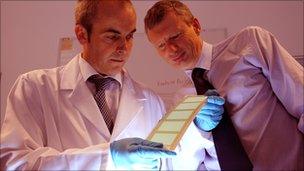£20m centre to turn homes into 'power stations'
- Published

The special coatings will trap and store solar energy
A £20m project which aims to turn homes and businesses into self-generating "power stations" has been launched.
Ordinary building materials such as steel and glass will be covered with a special coating that traps and stores solar energy.
Researchers say it could heat and power all sorts of buildings at a fraction of the cost of conventional solar panels.
Swansea University and Tata Steel claim it could provide a third of the UK's renewable energy by 2020.
Around 50 researchers, technologists and engineers will move into a purpose-built centre in Swansea to work on the project with the aim of having commercially available products on the market within five years.
Kevin Bygate, director of business development at Tata Steel, said: "The materials and the processes that we are using are abundantly available, low cost and suitable for mass manufacture.
"Why is this not everywhere today? It's too expensive. Our job is to make it low cost and economically effective on a large scale.
"The first generation technology is already available.
"We have a facility in Shotton, north Wales - its purpose is to develop the components and systems to deliver complete whole buildings in demonstrator forms. In fact that building is under construction now."
Mr Bygate said the technology would be suitable for any building from government and council offices to sports stadiums to schools.
He said the products could be fitted on both new and existing buildings and could lead to huge reductions in CO2 emissions.
Professor Dave Worsley, lead academic, said: "The ingredients used for making the solar devices are very similar to those used in normal coatings for any kind of building but they are put together in a different way.

The partners say the export potential for the products is huge
"It might not be quite as efficient as a silicon solar cell but the trick is to make it in a large enough area so that is irrelevant.
"The building, the wall, the roof, is the thing that is collecting the energy, it's storing the energy within it and then releasing it in a controlled way when you want it."
He said that larger buildings - such as supermarkets - could generate so much energy it could be fed into the national grid.
Export potential
"It's not just about these buildings generating their own energy," he added.
"If you have a supermarket - the roof is just sat there at the moment keeping the rain out.
"If it's there generating electricity for the building and distributing to its neighbouring buildings that's a very good way of managing electricity generation."
The project - which also involves the Welsh Assembly Government and other major industrial companies - has secured £9.5m funding from the Engineering and Physical Sciences Research Council and the Technology Strategy Board.
Mr Bygate said as well as having the long-term potential to create thousands of green energy jobs within the UK the export potential was huge.
"There are many parts of the world that because of their geography do not have electricity and probably never will have grid electricity," he explained.
"There, export potential is to go straight to buildings as power stations - self contained."
He said it was likely that the first generation of products would be manufactured in Wales.
"It's a real living example of industry, academia and government working together by turning what is fantastic world class knowledge that's held in our universities into economic growth for jobs and prosperity," he added.
- Published12 October 2010